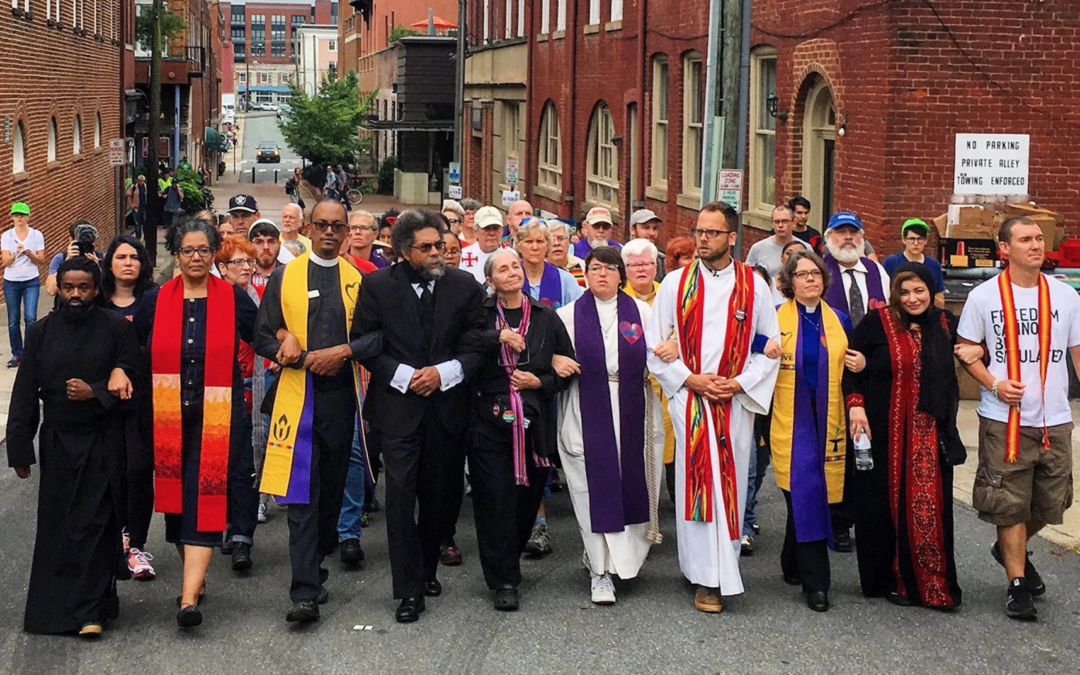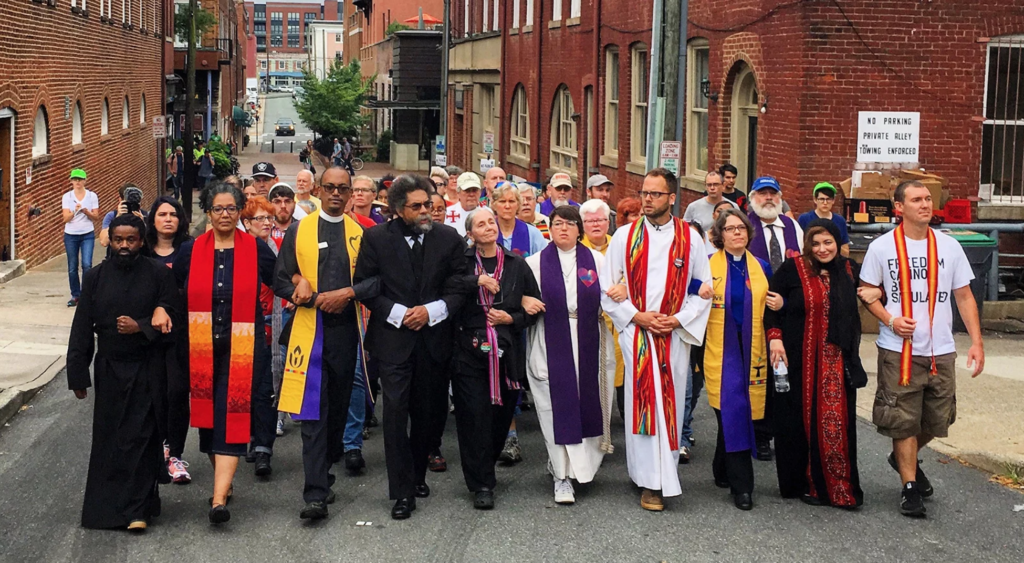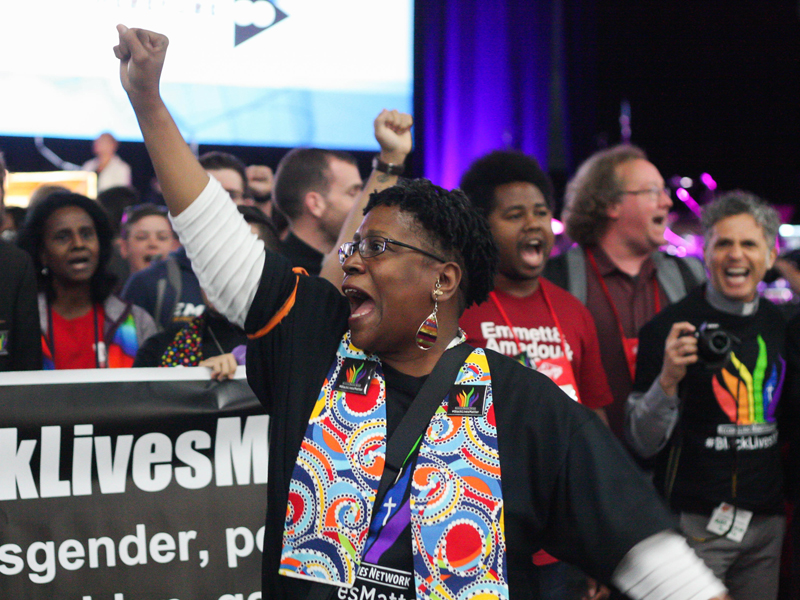
Battle lines form over social justice: Is it gospel or heresy?

Clergy and faith leaders march to counter protest the Unite the Right rally in Charlottesville on Aug. 12, 2017. RNS photo by Jordy Yager
An old question has recently found new energy among Christians.
“What does the gospel have to do with justice, particularly social justice?”
Justice has been a frequent topic these days — in the face of a stream of cellphone videos capturing instances of police brutality, conflict over the presence and future of Confederate monuments and racially charged responses to the nation’s changing demographics.
Christians, both as people of faith and citizens of this country, have pondered what to do in this current social climate. They have called for Christians to join or start movements for change as an explicit expression of discipleship and obedience to the prayer that God’s will would be done on earth as it is in heaven (Matthew 6:10).
And they have called for the church to make amends for the racial divisions of the past and present.
Others take a different view.
Where some see calls for biblical justice, they see heresy.
This week a group of Christians published “The Statement on Social Justice and the Gospel,” a response to what they call “questionable sociological, psychological, and political theories presently permeating our culture and making inroads into Christ’s church.”
The statement comes just after a short blog series posted by well-known Christian preacher and teacher John MacArthur, warning of the dangers of social justice.
MacArthur calls social justice a distraction from the gospel.
“Evangelicalism’s newfound obsession with the notion of ‘social justice’ is a significant shift — and I’m convinced it’s a shift that is moving many people (including some key evangelical leaders) off message, and onto a trajectory that many other movements and denominations have taken before, always with spiritually disastrous results,” he wrote.
MacArthur is one of the initial signatories of The Statement on Social Justice and the Gospel, which echoes his blog posts.
While Christians from many traditions, races and ethnicities have displayed a concern for social justice, it is a topic that particularly concerns black and brown folks. We have endured a long history of race-based discrimination that did not simply disappear after the March on Washington, the passage of the Civil Rights Act or the election of the nation’s first black president.

The Rev. Pamela Lightsey, center, leads advocates from the Black Lives Matter movement as they disrupt proceedings of the 2016 United Methodist General Conference in Portland, Ore. The demonstrators marched into the plenary session chanting slogans and gathered around the central Communion table. Photo by Maile Bradfield, courtesy of UMNS
Statements that dismiss social justice send a message that the ongoing marginalization many minorities still experience and struggle against is of no concern to their fellow Christians.
Or to God.
Or to the Bible — despite ample scriptural evidence that demonstrates God’s concern for the poor and the powerless and anger toward those who create oppressive conditions (Amos 5:24, Micah 6:8, Psalm 103:6, Isaiah 10:1, Luke 1:52-53, Luke 4:18).
Although much about this statement needs discussion, I will highlight one section in particular.
It reads: “We affirm that some cultures operate on assumptions that are inherently better than those of other cultures because of the biblical truths that inform those worldviews that have produced these distinct assumptions.”
The best word to describe the assertion above is “ethnocentric.”
Who gets to decide which cultures and which assumptions are closer to biblical truth? For most of American history, white Christians have claimed that privilege. That privilege is now being challenged.
I’m tempted to refute the recent statement on the gospel and social justice point-by-point — showing how it falls short of the Bible’s call for justice. But I think our time would be better spent on other pursuits. There’s too much work to be done — work that will be delayed by endless debates.
Here’s my advice.
Many of the people who authored and signed this statement have large ministries and platforms.
Avoid them.
Find other authors, preachers and teachers from whom you can learn. People like Austin Channing Brown or the podcasters and bloggers at Truth’s Table or The Witness, where I am a contributor. Or read Howard Thurman, the Rev. Martin Luther King Jr., Bryan Stevenson, James Baldwin or the other writers who have explored issues of justice.
If the supporters of statements that dismiss social justice as a distraction from the gospel headline a major conference, state your concerns to the organizers. If nothing changes, then don’t go.
If they do an interview on a podcast, find another episode to listen to. If they write more blogs to state their case, share other ones instead.
Statements like these are a distraction. They siphon off energy and attention that could be used to create new organizations and initiatives that help bring about justice and equality.
Instead of writing a rebuttal to the statement on social justice, why not write a proposal for a new scholarship to help underrepresented groups go to college and stay out of debt? Why not donate money to support ministries run by and geared toward racial and ethnic minorities? Why not research a cause and find out how you can get involved?
Refusing to give more attention to the people who oppose social justice is not a statement on their standing with God. This does not mean they are not sincerely attempting to follow Christ. It does not mean that they have not said helpful things on other topics in the past.
It simply means that in this case, they have made statements so troublesome that we must register our objections in visible ways.
Christians should never give up hope that people can change. Yet going back and forth, especially online, about social justice with those who see it as a dangerous intrusion into the church often does not alter anyone’s opinions and may lead to more frustration.
In the end, I think more people will be persuaded to change their minds about social justice by looking at the fruit of the people who engage in it rather than by arguing on social media about the validity of doing so.
Half a century after the civil rights movement of the 1950s and 1960s, it’s easy for people to claim that they would have been among the protesters and marchers and those who risked it all for the cause of justice. Well, the struggle for civil rights never ended. Now is your chance to get involved for love of God and love of neighbor.
(Jemar Tisby is president of the black Christian collective The Witness and author of the forthcoming book “The Color of Compromise: The Truth About the American Church’s Complicity in Racism.” The views expressed in this commentary do not necessarily represent those of Religion News Service.)

